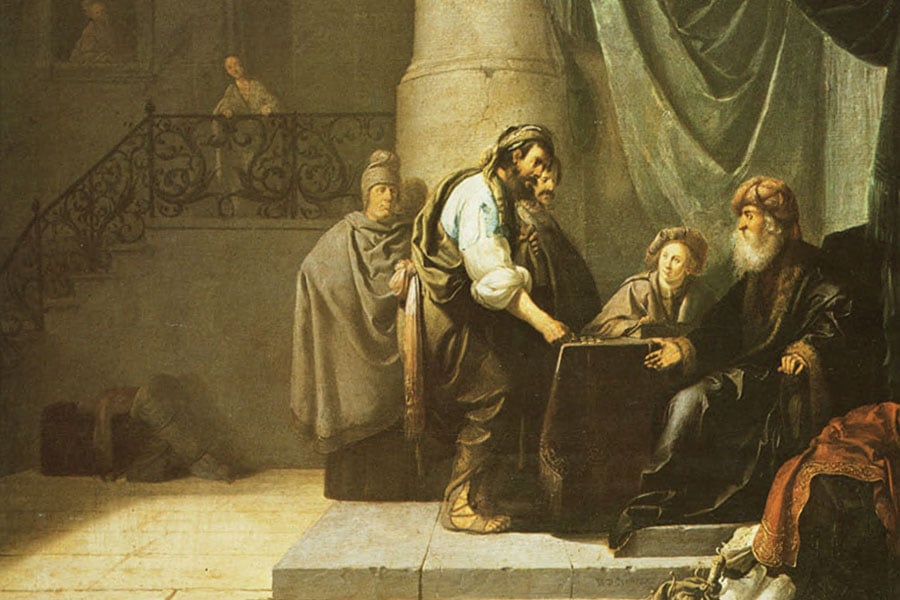Let us lectio: responsibility of discipleship

The Parable of the Talents, Willem de Poorter, 17th century
Memorial of Saint Augustine, Bishop and Doctor of the Church, August 28, 2021
Steps to Lectio Divina
Start by using these steps to reflect on the Scripture verse. Then read Callie's meditation slowly.
Lectio: Having asked for the grace to hear God's word, read the passage twice.
Meditatio: During the second reading, pause whenever so moved and reflect on a word, a sentence, or an image that strikes you.
Oratio: Speak directly to God, and open your reflection to Him.
Contemplatio: Listen contemplatively for any response God might choose to make. Remember that God responds to us at times with loving silence.
The Scripture
Matthew 25:14-30
Jesus told his disciples this parable:
“A man going on a journey called in his servants and entrusted his possessions to them. To one he gave five talents; to another, two; to a third, one– to each according to his ability. Then he went away.
Immediately the one who received five talents went and traded with them, and made another five. Likewise, the one who received two made another two. But the man who received one went off and dug a hole in the ground and buried his master’s money.
After a long time the master of those servants came back and settled accounts with them.
The one who had received five talents came forward bringing the additional five. He said, ‘Master, you gave me five talents. See, I have made five more.’
His master said to him, ‘Well done, my good and faithful servant. Since you were faithful in small matters, I will give you great responsibilities. Come, share your master’s joy.’
Then the one who had received two talents also came forward and said, ‘Master, you gave me two talents. See, I have made two more.’
His master said to him, ‘Well done, my good and faithful servant. Since you were faithful in small matters, I will give you great responsibilities. Come, share your master’s joy.’
Then the one who had received the one talent came forward and said, ‘Master, I knew you were a demanding person, harvesting where you did not plant and gathering where you did not scatter; so out of fear I went off and buried your talent in the ground. Here it is back.’
His master said to him in reply, ‘You wicked, lazy servant! So you knew that I harvest where I did not plant and gather where I did not scatter? Should you not then have put my money in the bank so that I could have got it back with interest on my return? Now then! Take the talent from him and give it to the one with ten.
For to everyone who has, more will be given and he will grow rich; but from the one who has not, even what he has will be taken away. And throw this useless servant into the darkness outside, where there will be wailing and grinding of teeth.’”
Reflection
In the parable of the talents, at face value, the master’s rebuke to the lazy servant seems excessively harsh. Perhaps the servant buried the talent out of awe and respect for his master? Perhaps, he wished to protect the talent (a fortune for a servant) from tarnish or robbery? But the master does not want the servants to return his investment unused and unfruitful. In fact, rather than being a sign of treasuring his gifts, the wicked servant’s act of burying the talent shows a lack of respect and obedience.
At the beginning of this parable, we see the “man going on a journey” who is later revealed to the reader as “master.” The master in the parable is Jesus, the Son of Man, who has ascended to the Father and will return to judge the whole world.
To say we are His, to claim Him as Lord, to receive Baptism, are all part of our entering into a relationship with Jesus. Admittedly, a master-servant relationship is foreign in our cultural context, but it is an important relationship, nonetheless. There are inherent expectations within the servant-master relationship, as there are with any relationship. With this in mind, this parable sets the stage to establish what is expected of us as servants and disciples to the Lord, our master.
One challenge in preparing candidates for the reception of Baptism is inculcating in them a deep and free understanding of this aspect of the Christian life. How wonderful it is when a candidate for the sacrament understands that they undertake a new relationship with God after being cleansed by the waters of Baptism. The newly baptized thereby take upon themselves the responsibilities of a child to a father as well as those of a disciple to a master. As Jesus’ servants, we too must render an account when He returns to judge the earth.
When we pray for the candidates preparing for Easter and beyond, let us pray for the resolve to recognize and joyfully accept our blessed responsibilities of discipleship. And, let us also pray for our own souls. Have we wisely cultivated and invested in the gifts that God has entrusted to us, or are we in need of His infinite and just mercy? Are we in need of seeking His compassion in the sacrament of Penance to grant us the strength to continue to be faithful in such “small matters?”

Callie Nowlin, MTS, is a regular contributor to the North Texas Catholic.
Scripture texts in this work are taken from the New American Bible, revised edition © 2010, 1991, 1986, 1970 Confraternity of Christian Doctrine, Washington, D.C. and are used by permission of the copyright owner. All Rights Reserved. No part of the New American Bible may be reproduced in any form without permission in writing from the copyright owner.
